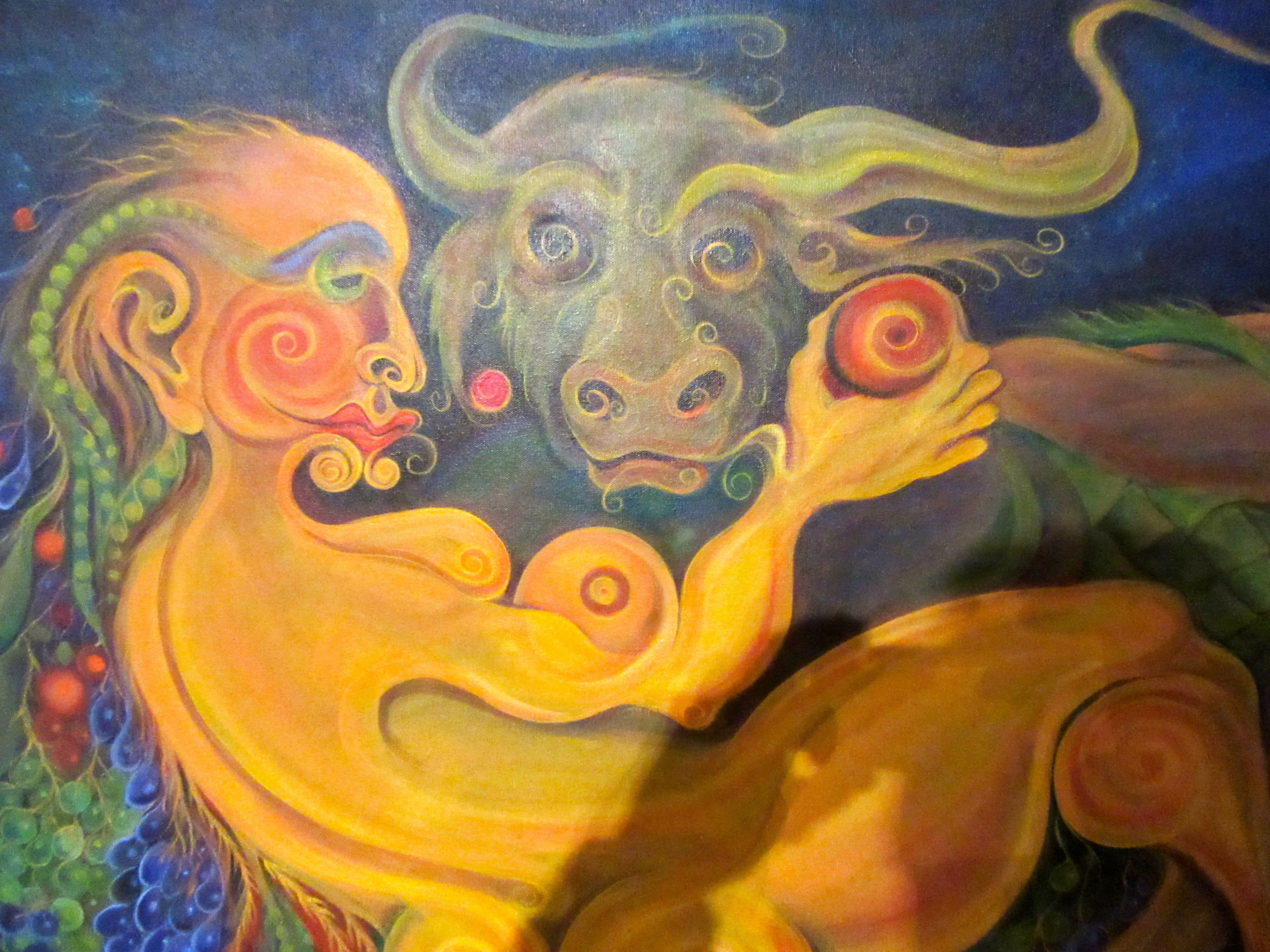COMIDA DE PUTA (F%&KING LOUSY FOOD), a new play by Desi Moreno-Penson at the West End Theater, transposes the Greek myth of Phaedra to the Nuyorican Bronx and its cosmology to the spirit world of Santeria. There are signposts along the way that point to the original, if you wish to follow them. The Phaedra figure is, to begin with, named Laluz, which means “light” – the Greek means “bright.” Minotaur Foods, a gentrifying grocery conglomerate, is gobbling up the bodegas in the neighborhood, one of which is owned by the Theseus figure, Laluz/Phaedra’s husband, called Viejo. It was, of course, Theseus that defeated the man-bull of the Labyrinth. The play’s title is, presumably, a reference to the food and real estate wars, as well as to the sexual theme at the heart of the Phaedra story.
The tragic architecture of the myth is stark and essential. The lust of a new wife for the son of her husband from a previous union leads to retribution and death. Around that core, the director Lorca Peress keeps the play’s swirl of subsidiary dramas in enough check to maintain the tragedy, especially when it emerges in the second act with great dramatic and psychological power. The center holds amid a plethora of topical concerns, not just gentrification but also gender relations. The persons of the tragedy are remarkably equal in Moreno-Penson’s version: Laluz is central but not dominant, and the actors are, for their part, uniformly strong.
Alex R. Hernandez as Sotero, the sexually desired son (Hippolytus in the original), and Darlenis Duran as Alcidia, the young woman with whom he is in love, have, near the start of the second act, the most touching moments of the play. Sotero and Alcidia are blameless in the tragedy, misunderstood and falsely maligned, she as sexually loose, he as unmanly. When they meet after Sotero flees the bodega to avoid Laluz’s advances, the hesitant dance of their feelings is tenderly involving. Peress has managed, here and throughout, to infuse the classic ambiance with a contemporary honesty. Duran strikes this note all the more impressively since, at the end of the previous act, she enacts one of the play’s most stylized and magic realist sequences.
Mariana Parma, as Laluz, stands out as a physical presence; walk and gesture come off in her as natural and stylized at the same time, the extended arm or the step on the ground visibly soft yet forceful and, at times, symbolic. The strength of her presence is structurally important, since the Phaedra figure drives the tragedy, even on its edges, to the final cleansing. That Parma is a stylistic contrast to the others might have been problematic, but instead it gives her an indomitability that they play off to good effect. Neither the exceptionally sensitive Roseanne Almanzar, as Rosalia, or Gustavo Heredia, as the strongly macho Viejo, can dislodge her; she’s an embodiment, in a single person, of tragic inevitability.
Peress’s stagecraft is, in this Multistages production, diverse and multi-framed. There’s a substantial video component, in which Jane Velez-Mitchell plays a reporter on the scene and Dennis Gagomiros the capitalistically cynical Minos, flack for the grocery chain. Also on tape are Vebnuz Delmar, Mykal Monroe, Suni Reyes, Anita Velez, and Almanzar in a second role. Framing the whole is a drummer, Lafrae Sci, and a Chorus, Marcos Sotomayor, who establishes the larger cultural context and doubles as Alcidia’s disapproving brother Manny.
The Phaedra tale has been told and retold more than once, starting with the Hippolytus of Euripides. Racine’s Phèdre is one of the greatest of all tragic dramas, and O’Neill’s version, Desire Under the Elms, remains a queasily disquieting American tragedy. I was never tempted to compare COMIDA DE PUTA to any of those: it states its own terms and stands by them. I wondered if the first act couldn’t have been more structurally rigorous, but overall it is an engrossing piece of theater, topically meaningful and culturally expressive, attuned to the tragic power of its origins.
Click on Multistages for information on future productions.

2 responses to “Comida de puta”
Thanks for the nice review. Just a small correction: despite the spelling of the website, it’s Gagomiros, not Gagamiros. I’ve been called “gaga” my whole life, well before, well, you know who.
-Dennis
Thanks for calling that to my attention. I’ve made the correction – sorry.